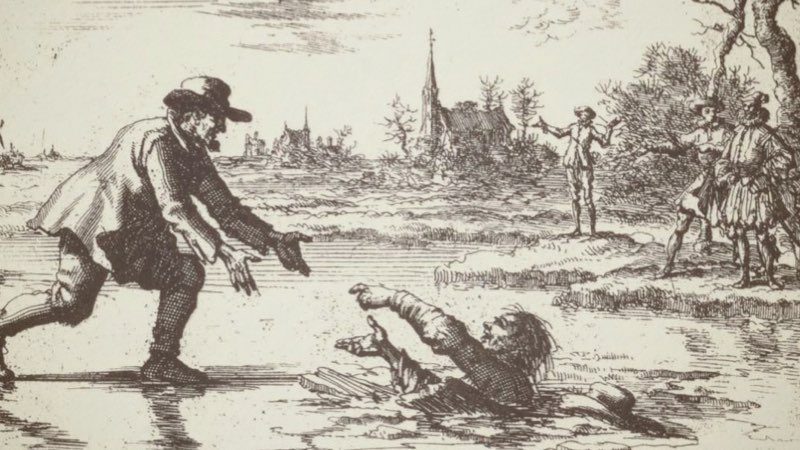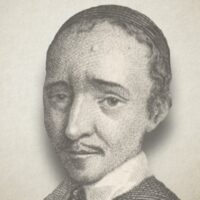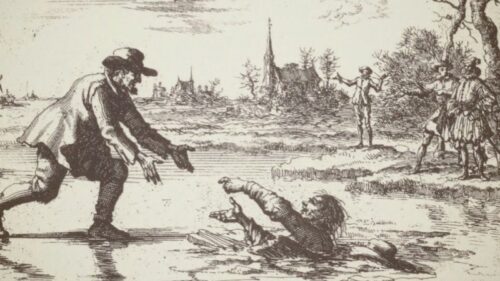
16. Of the False Church’s Claims (Part 2)
Various Arguments from the Holy Scriptures, Showing that Peter was at Rome during the Time Paul was there, Except (as has been Explained above) at the Close of His Life
In this demonstration we shall forego the method employed by Sebastian Frank, Gysius, and others, who have written syllogistically upon this subject, and shall confine ourselves solely to the express testimony of (or, at least, plain inferences from) Holy Scripture, upon which we propose to found our arguments.
Reason.—First Argument.—When Paul drew near the city of Rome, where he was to be arraigned before Cesar, the brethren [By which of the other apostles these brethren at Rome were converted, is not mentioned in the text; but it may have been that they were converted on the day of Pentecost at Jerusalem, for at that time strangers of Rome were there. Acts 2:10.] came out of the city to meet him, as far as Appu Forum, and the Three Taverns, whom, when Paul saw, he took courage. Acts 28:15: But among these Peter is not once mentioned, which would undoubtedly have been the case, had he been with them and occupied the episcopal throne at that place, as is pretended.
Second Argument.—When it came to pass, that Paul was to give an account before the emperor for the first time, he was forsaken by all, and no man stood with him, so that he complained of it to Timothy. II Tim. 4:16, Now, if Peter had been at Rome; he certainly would not have forsaken Paul, whom he was wont to call his beloved brother, II Pet. 3:15; but would have stood by him with counsel and actual assistance, according to his ability. This, however, did not happen; which clearly shows that he was not there at that time; unless some one might conclude, that he, who before had forsaken his Lord and Saviour (which was a matter of much consequence), now probably also forsook Paul, who was inferior. To this may serve as reply: That Peter, at the time he forsook Christ, was not filled with the gift of the Holy Ghost, which was not poured upon the apostles until after Christ’s ascension, Acts 2:1-3; hence he could easily come to this fall; but now, being filled with the Holy Ghost, [Howbeit when He, the Spirit of truth, is come, He will guide you into all truth. John 16:13.] it was quite otherwise, so much so, that he and his fellow apostles feared no suffering, not even death itself. Com- pare Acts 4:19-21 with 5:40-42 and 12:3,4. Also I Pet. 3:14 and 4:16. Moreover, in Paul’s complaint to Timothy not a word is mentioned as to Peter having forsaken him; which, had it happened, would certainly, as a notable matter, not have been passed over in silence; more especially, as he mentions some of those who forsook him, by name, as, Demas, Alexander the coppersmith, etc.
Third Argument.—When Paul was confined in prison at Rome, and bound in chains, he commended Onesiphorus, because he had visited him, and was not ashamed of his chain; without mentioning anything about others, saying: “The Lord give mercy unto the house of Onesiphorus; for he oft refreshed me, and was not ashamed of my chain” (II Tim. 1:16). But why does he not commend Peter as having visited him in his bonds? or, if Peter was there and did not do so, but was ashamed of his chain, why does he not complain, that so great a man, who ought to have been a leader unto others, was so negligent therein? Doubtless, if Peter had been in the city at that time, and visited, or not visited, him in prison, Paul would not have passed it over in utter silence, without commending or complaining of it.
Fourth Argument.—When many had departed from Paul, while he was in prison, he made mention of one who had remained by, or with him, namely, in the city of Rome. He calls him Luke, and says: Only Luke is with (or by) me. II Tim. 4:11. It follows, therefore, that at the time when Paul wrote this, Peter was not at Rome, or it could not have been that only Luke was with him.
Fifth Argument.—A little further on from the above mentioned words, Paul requests of Timothy, that when he came to him, he should bring Mark with him, since the same would be very profitable to him for his ministry, saying: Take Mark, and bring him with thee (when thou comest); for he is profitable to me for the ministry. II Tim. 4:11. Now, if Peter was in Rome at that time, why was Paul under the necessity of sending for Mark for the ministry? or, if he was not there, why did he not send for Peter? Certainly, if he had sent for him, he would, unless prevented by some important cause, not have refused to come: and then it could be concluded, that Peter was there a considerable time, since, as we find, they both died considerable time afterwards. But it does not appear that Paul sent for him; hence, it cannot be concluded, that he came in answer to his summons; and even if he had come at that time, his stay there could not have lasted several years, much less twenty-five years, as the papists say, since death overtook him as well as Paul, as has been shown in its proper place. The preparation, however, of this whole argument is unnecessary and superfluous.
Sixth Argument.—Paul wrote various epistles from his prison at Rome to the believers; as to the Galatians, Ephesians, Philippians, Colossians, to Timothy, Philemon, etc., in which he puts various salutations from believers of the church at Rome, as also, in the beginning of the same makes mention sometimes of his fellow laborers; but he never mentions Peter. We will show here the manner in which this is done. In the beginning of the epistle to the Philippians he writes these words: Paul and Timotheus, the servants of Jesus Christ. Now, why does he not add here: and Simon Peter? Nearly in the same manner he commences the epistle to the Colossians, saying; “Paul, an apostle of Jesus Christ by the will of God, and Timotheus, our brother.” Why does he not add: and Peter, the chief apostle? In concluding these epistles he adds the salutations of the saints who were with him. To the Philippians he writes: “All the saints salute you . . . chiefly they that are of Caesar’s household” (Phil. 4:21,22). To the Colossians he addresses these words: “Epaphras, who is one of you, a servant of Christ, saluteth you” (Col. 4:12). Also: Luke, the physician, greets you. Verse 14. Peter is not mentioned here at all, which, certainly, had he been there, would have been highly necessary. This same manner he followed in all the other epistles which he wrote from Rome. To Timothy he says: “Eubulus greeteth thee, and Pudens, and Linus, and Claudia” (II Tim. 4:21). To Philemon: “There salute thee Epaphras. . . Marcus, Aristarchus” (Phil. 23, 24). There might be much said upon this subject, but it would all amount to this: that it would be a strange thing, if Peter was at Rome, when Paul wrote his epistles from the Roman prison, that the latter did never mention in these epistles a salutation from Peter (which, as has been shown, he did not); seeing he mentions salutations from different leaders and members of the Roman church, whom he calls by name: hence it is quite reasonable to conclude, that Peter was not there during that time. Besides the six arguments mentioned, proving that during the time Paul was imprisoned under Nero, Peter was not at Rome, as far as the testimony of Holy Scriptures go in regard to this, there follow various circumstances showing (by like virtue of Holy Scripture), that also during the time Paul was out of prison, Peter was not to be found in this city.
First Circumstance.—Here is to be considered, why Paul wrote an epistle to the Roman church, as well for the confirmation of the Christian faith, as for stirring up in the moral virtues (which epistle is still in existence), if Peter was there at that time, and had the charge of said church? or, if it was necessary for important reasons, that he should write to them, why he did not send this epistle to Peter as their leader, like he did to Timothy, the teacher of the Ephesian church; and to Titus, the teacher of the church in the Island of Crete? Or, at least, if we look at the contents of this epistle, we may well consider, why he did not ad- dress a salutation to him, or once mention him by name? seeing he filled nearly a whole chapter with the names of those whom he salutes at Rome: as, Aquila with his wife Priscilla, Epenetus and Mary, together with Andronicus, Junia, Amplias, Urbanus, Apelles, Herodion, those of the household of Narcissus (the women), Tryphena and Tryphosa, Persis, Rufus, Asyncritus, Phlegon, Hernias, Patrobas, Philologus, Nereus, etc., Rom. 16 throughout; without mentioning in any way whatever the person or name of Peter; from which there may be concluded again with good reason, that which has been concluded before from the account of the salutations which Paul wrote while in prison at Rome, namely, that Peter was not in this city at that time?
Second Circumstance.—When it afterwards happened that Paul, having traveled through Arabia and the country of Damascus, returned after three years, with a particular desire to see Peter; he did not seek him at Rome, but at Jerusalem; where, when he had found him, he abode with him fifteen days: and then departed again into the regions of Syria and Cilicia. Gal. 1 :17-21.
Third Circumstance.—When fourteen more years had elapsed, namely, those spent by Paul in his Syrian and Cilician journey, where was Peter to be found? Certainly not at Rome, but at Antioch; for there Paul came to him, and rebuked him, because he had eaten with the Gentiles in the presence of the Jews. Compare Gal. 2 :1 with verses 11,12.
Fourth Circumstance.—When some came down from Judea, and troubled the brethren, saying that, unless they were circumcised after the manner of Moses, they could not be saved; and Paul, Barnabas, and other pious men were sent to the apostles and elders, to consult about the matter; Peter as well as the others to whom they were sent, was found at Jerusalem. Acts 15:1-7.
Fifth Circumstance.—Gal. 2 :7, we read, that the uncircumcision (that is, the Gentiles) was committed to Paul, but the circumcision (that is, the Jews or the Jewish nation) to Peter; also, verse 9, that Peter (there called Cephas) together with James and John gave to Paul and Barnabas the right hand and agreed, that these should go unto the heathen, but they unto the circumcision (the Jews); namely, to preach the Gospel unto them. It is, therefore, a settled fact, that Peter was properly a teacher of the Jews (after this agreement was made), and not of the Gentiles. But if he had taught among the Romans, who were Gentiles by nature, he would have gone altogether beyond his engagement and promise; which certainly is not to be supposed of so great and eminent a man as Peter was at that time.
Sixth Circumstance.—From the two epistles of Peter, especially from the words, I Pet. 1:1, it evidently appears, that he preached to the strangers scattered throughout Pontus, Galatia, Cappadocia, Asia, and Bithynia (namely those who were scattered there from the twelve tribes of Israel) according to the statement of James, chap. 1:1; for which preaching, since these countries are very far, some even a hundred and more leagues apart, several years were required, in order to travel through them; during which time Peter apparently could not be there and at Rome at once; this is incontrovertible.
Seventh Circumstance.—At the end of the first epistle of Peter, namely I Pet. 5:13, are these words: “The church that is at Babylon, elected . . . saluteth you.” How could Peter send a salutation from the church at Babylon, unless he was with it in Babylon at that time? But if he was in Babylon, he was not at Rome, unless he had two bodies; of which we do not read anything, nor have we any reason to believe it.
Eighth Circumstance.—Those who hold that Peter was bishop at Rome, make no distinction be- tween the words apostle, or messenger, and bishop, or overseer; yet there always has been a marked difference between the office of an apostle and that of a bishop. The office of an apostle was to travel from one country to another, yea, through the whole world, and preach the Gospel to those who had not yet heard it; without being bound to any particular place or church, as appears from Matt. 28:19; Mrk 16:15. On the other hand, the office of a bishop or overseer was to watch over, care for, feed and govern, as a shepherd his flock, a particular church, unto which the Gospel had been already preached, and which had accepted faith and the sign of holy baptism. Compare Acts 20:28 with I Tim. 3:1-5; Tit. 1:5-7. Now, it is a fact, that properly not the latter, but the former office was enjoined upon Peter, for he gives himself the first mentioned name— apostle (see I Pet. 1:1 and II Pet. 1:1); for which purpose Christ Himself had chosen him, Luke 6:13, 14, and sent him out, as can plainly be seen in the last chapter of Matthew and of Mark. How could it be then, that Peter sat as bishop of the church in the city of Rome? and, what is still more—for a considerable number of years! unless it be said that Peter abandoned his charge, and accepted another office and ministry than the one to which he was called; which it would be difficult to prove, since nothing is mentioned of it in Holy Writ.
Further Remarks on the foregoing circumstances.—If one should confine himself solely to the testimony of the holy Scriptures, not accepting anything else as worthy of belief, it could in no wise be shown that Peter was ever at Rome; but, since the holy Scriptures do not relate all that has happened, the testimony of some accepted authors of that time may be recognized as credible, as far as their testimony is not contrary to what is expressed in holy Scripture. We have shown from the apostolic writings, that during the time Paul wrote his epistles in the prison at Rome, and also during the whole period that he (Peter) was preaching in foreign countries, Peter was not in Rome, but in Jerusalem. Antioch, Pontus, Galatia, Cappadocia, and in other places where the Jews were scattered. This we have plainly shown, first by six arguments, and then by eight circumstances, derived from the holy Scriptures. But as to where Peter was, or how he died, after Paul wrote his last epistle from Rome, the Scriptures are silent. Hence the testimony of those writers whom we have just mentioned cannot well be contradicted; who maintain, that Peter shortly before his death came to Rome, and there laid down his life for the doctrine of the Evangelical truth; without mentioning anything there about his bishopric, much less, popedom.
Thieleman J. Van Braght (1625-1664) was an Anabaptist who is best known for writing a history of the Christian witness throughout the centuries entitled “The Bloody Theater or Martyrs Mirror of the Defenseless Christians who baptized only upon confession of faith, and who suffered and died for the testimony of Jesus, their Saviour, from the time of Christ to the year A.D. 1660” (1660).
Thieleman J. Van Braght, Martyrs Mirror




